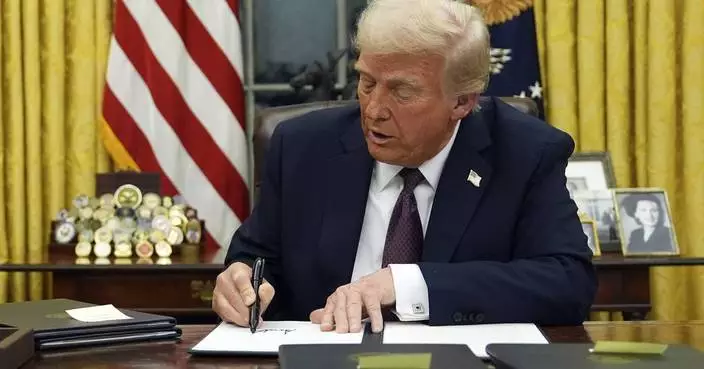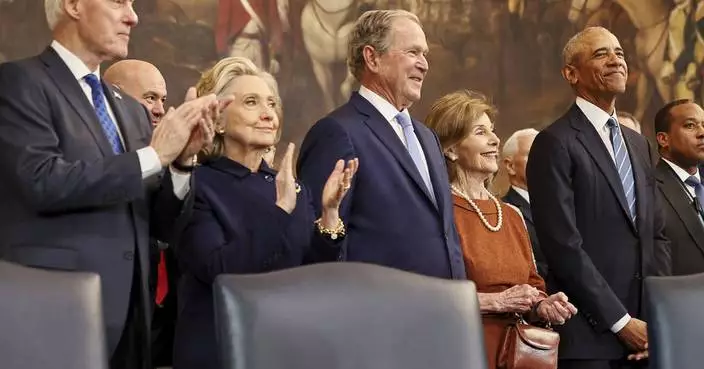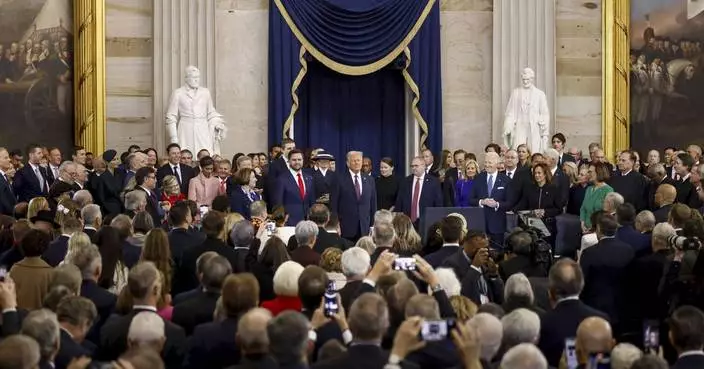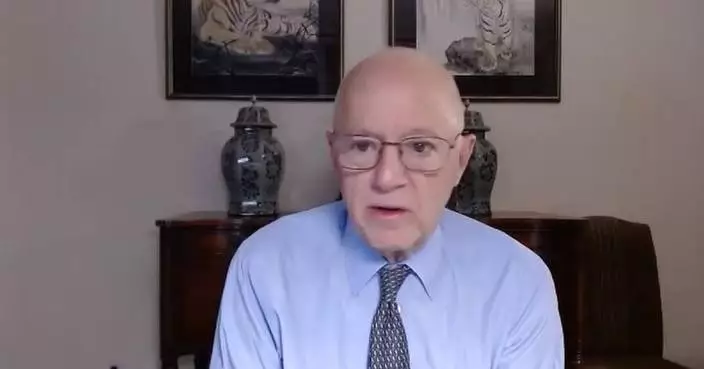Amazon reported a boost in its quarterly profits Thursday, but the company missed revenue estimates, sending its stock lower in after-hours trading.
The Seattle-based tech company said it earned $13.5 billion for the April-June period, higher than the $10.99 billion industry analysts surveyed by FactSet had anticipated. Amazon earned $6.7 billion during the same period last year.
Earnings per share for the second quarter came out to $1.26, higher than analysts' expectations of $1.03.
However, investors reacted negatively to other results, leading Amazon shares to fall more than 6% after the closing bell. The company posted revenue of $148 billion, a 10% increase that fell slightly below analyst expectations of $148.67 billion.
Amazon also said it expects revenue for the current quarter, which ends Sept. 30, to be between $154 billion and $158.5 billion — lower than the $158.22 billion forecast by analysts.
Amazon boosted its spending during the COVID-19 pandemic to keep up with higher demand from consumers who became more reliant on online shopping. But as demand cooled and wider economic conditions pressured other parts of its business, the company aggressively cut costs by eliminating unprofitable businesses and laying off more than 27,000 corporate employees.
The cost-cutting has led to growth in profits. However, Amazon is also feeling the benefits of the buzz around generative artificial intelligence, which has helped reaccelerate its cloud computing unit, Amazon Web Services, after it experienced a slowdown.
The company said Thursday that Amazon Web Services saw a 19% jump in revenue compared to the same period last year.
“We’re continuing to make progress on a number of dimensions, but perhaps none more so than the continued reacceleration in AWS growth,” Amazon CEO Andy Jassy said in a statement.
The cloud computing unit, whose customers are mostly businesses, has been attempting to lure in more customers with new tools, including a service called Amazon Bedrock that provides companies with access to AI models they can use to make their own applications. In April, Jassy said AWS was on pace for $100 billion in annual revenue.
But Amazon is also expected to spend more this year to support the unit. During a call with reporters, Chief Financial Officer Brian Olsavsky said the company spent more than $30 billion during the first half of the year on capital expenditures, the majority of it to boost infrastructure for AWS. It expects that to increase during the second half, he said.
Like other tech companies, Amazon has been ramping up investments in data centers, chips and the power needed for AI workloads, Olsavsky said. Among other projects, the company plans to put billions toward additional infrastructure in Saudi Arabia, Mexico and Mississippi, where it has secured state incentives to build two data center “complexes."
“The key for us is always to make sure that we’re matching that supply and demand, and running it efficiently so we don’t have excess capacity," Olsavsky said. "That’s not a concern right now. Our concern is more on getting the supply.”
Meanwhile, revenue for the company’s core e-commerce business grew by 5%, which was more sluggish compared to recent quarters. The numbers did not include sales from Amazon’s annual Prime Day discount event, which took place last month.
Olsavsky said the company came up short on revenue growth in North America because customers were still being cautious with their spending and trading down to cheaper items.
Amazon said sales from its advertising business — which mostly comes from ad listings on its online platform — jumped by 20%. Earlier this year, it began placing ads on movies and TV shows found on its Prime Video service to bring in extra dollars.
Last month, Prime Video also became one of three companies to sign an 11-year media rights deal with the National Basketball Association.
But the company faces other challenges.
This week, federal regulators said Amazon was responsible for the recall of more than 400,000 hazardous products that were sold on its platform by third-party sellers and shipped using its fulfillment service.
Amazon is also facing an antitrust lawsuit, which alleges it has been overcharging sellers and stifling competition.
Amazon’s results followed other earning reports this week from tech giants such as Microsoft, Meta and Google’s corporate parent, Alphabet Inc.
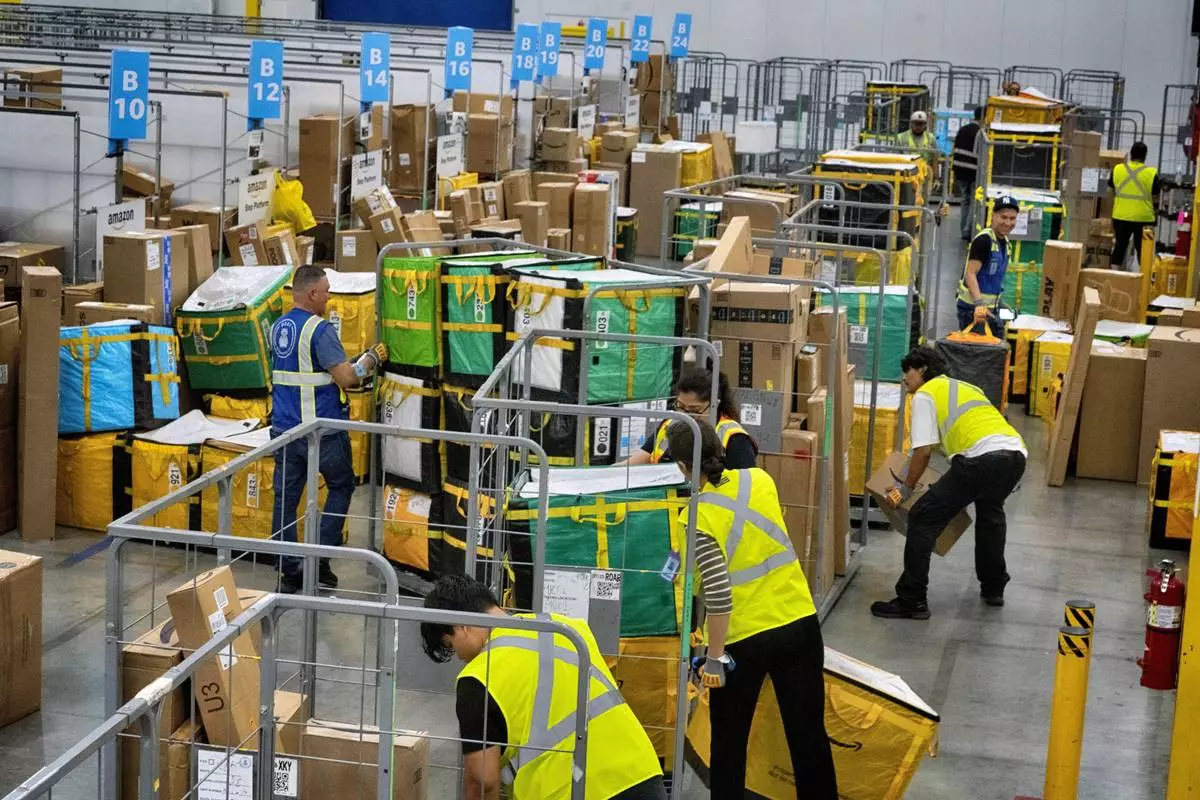
FILE - Amazon employees load packages on carts before being put on to trucks for distribution for Amazon's annual Prime Day event at an Amazon's DAX7 delivery station on July 16, 2024, in South Gate, Calif. Amazon reports earnings on Thursday, Aug. 1, 2024. (AP Photo/Richard Vogel, File)
President Donald Trump moved to end a decades-old immigration policy known as birthright citizenship when he ordered the cancellation of the constitutional guarantee that U.S.-born children are citizens regardless of their parents’ status.
Trump's roughly 700-word executive order, issued late Monday, amounts to a fulfillment of something he's talked about during the presidential campaign. But whether it succeeds is far from certain as attorneys general in 18 states and two cities challenged the order in court on Tuesday, seeking to block the president.
Here's a closer look at birthright citizenship, Trump's executive order and reaction to it:
Birthright citizenship means anyone born in the U.S. is a citizen, regardless of their parents' immigration status. People, for instance, in the United States on a tourist or other visa or in the country illegally can become the parents of a citizen if their child is born here.
It's been in place for decades and enshrined in the 14th Amendment to the Constitution, supporters say. But Trump and allies dispute the reading of the amendment and say there need to be tougher standards on becoming a citizen.
The order questions that the 14th Amendment extends citizenship automatically to anyone born in the United States.
The 14th Amendment was born in the aftermath of the Civil War and ratified in 1868. It says: “All persons born or naturalized in the United States and subject to the jurisdiction thereof, are citizens of the United States and of the State wherein they reside.”
Trump's order excludes the following people from automatic citizenship: those whose mothers were not legally in the United States and whose fathers were not U.S. citizens or lawful permanent residents; people whose mothers were in the country legally but on a temporary basis and whose fathers were not citizens or legal permanent residents.
It goes on to bar federal agencies from recognizing the citizenship of people in those categories. It takes effect 30 days from Tuesday, on Feb. 19.
The 14th Amendment did not always guarantee birthright citizenship to all U.S.-born people. Congress did not authorize citizenship for all Native Americans born in the United States, for instance, until 1924.
In 1898 an important birthright citizenship case unfolded in the U.S. Supreme Court. The court held that Wong Kim Ark, who was born in San Francisco to Chinese immigrants, was a U.S. citizen because he was born in the country. After a trip abroad, he had faced denied reentry by the federal government on the grounds that he wasn't a citizen under the Chinese Exclusion Act.
But some advocates of immigration restrictions have argued that while the case clearly applied to children born to parents who are both legal immigrants, it’s less clear whether it applies to children born to parents without legal status.
Eighteen states, plus the District of Columbia and San Francisco sued in federal court to block Trump's order.
New Jersey Democratic Attorney General Matt Platkin said Tuesday the president cannot undo a right written into the Constitution with a stroke of his pen.
“Presidents have broad power but they are not kings,” Platkin said.
Not long after Trump signed the order, immigrant rights groups filed suit to stop it.
Chapters of the American Civil Liberties Union in New Hampshire, Maine and Massachusetts along with other immigrant rights advocates filed a suit in New Hampshire federal court.
The suit asks the court to find the order to be unconstitutional. It highlights the case of a woman identified as “Carmen," who is pregnant but is not a citizen. The lawsuit says she has lived in the United States for more than 15 years and has a pending visa application that could lead to permanent status. She has no other immigration status, and the father of her expected child has no immigration status either, the suit says.
“Stripping children of the ‘priceless treasure’ of citizenship is a grave injury,” the suit said. "It denies them the full membership in U.S. society to which they are entitled."
In addition to New Jersey and the two cities, California, Massachusetts, Colorado, Connecticut, Delaware, Hawaii, Maine, Maryland, Michigan, Minnesota, Nevada, New Mexico, New York, North Carolina, Rhode Island, Vermont, and Wisconsin joined the lawsuit to stop the order.
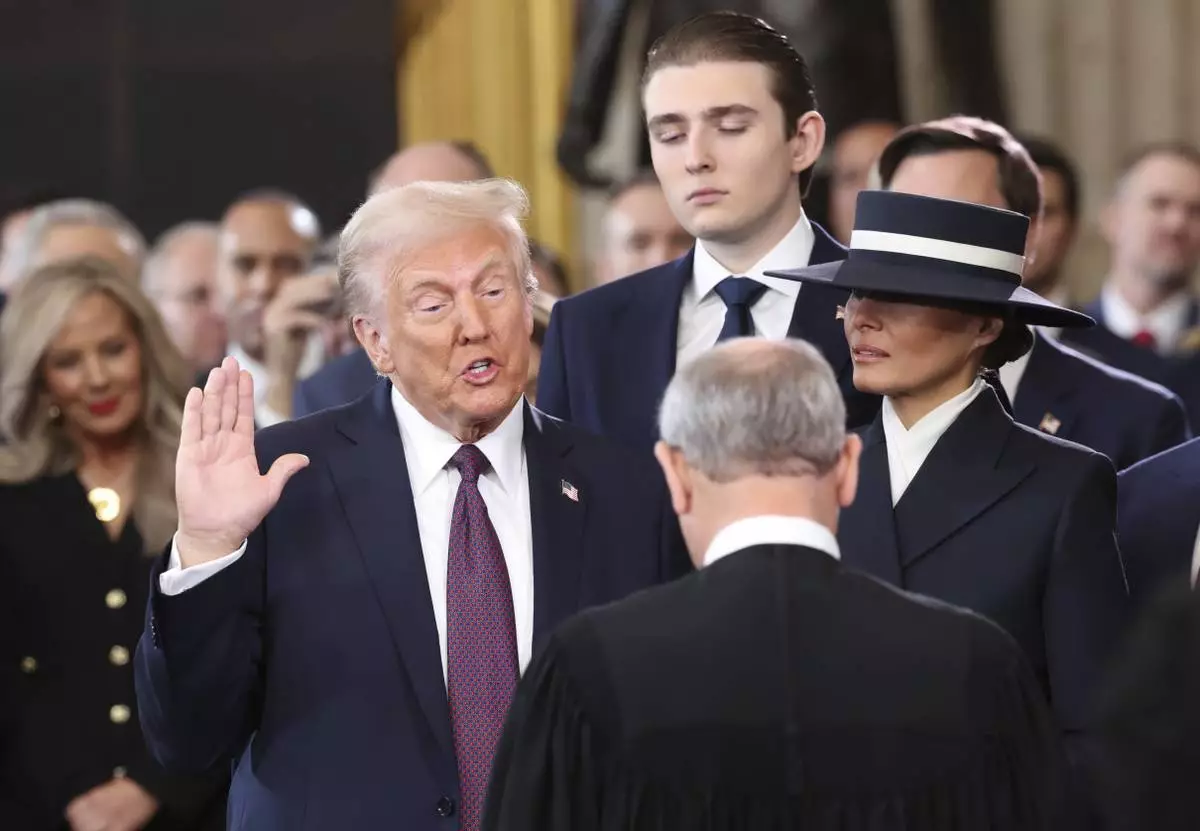
President-elect Donald Trump, from left, takes the oath of office as Barron Trump and Melania Trump watch at the 60th Presidential Inauguration in the Rotunda of the U.S. Capitol in Washington, Monday, Jan. 20, 2025. (Kevin Lamarque/Pool Photo via AP)

President Donald Trump signs executive orders in the Oval Office of the White House, Monday, Jan. 20, 2025, in Washington. (AP Photo/Evan Vucci)
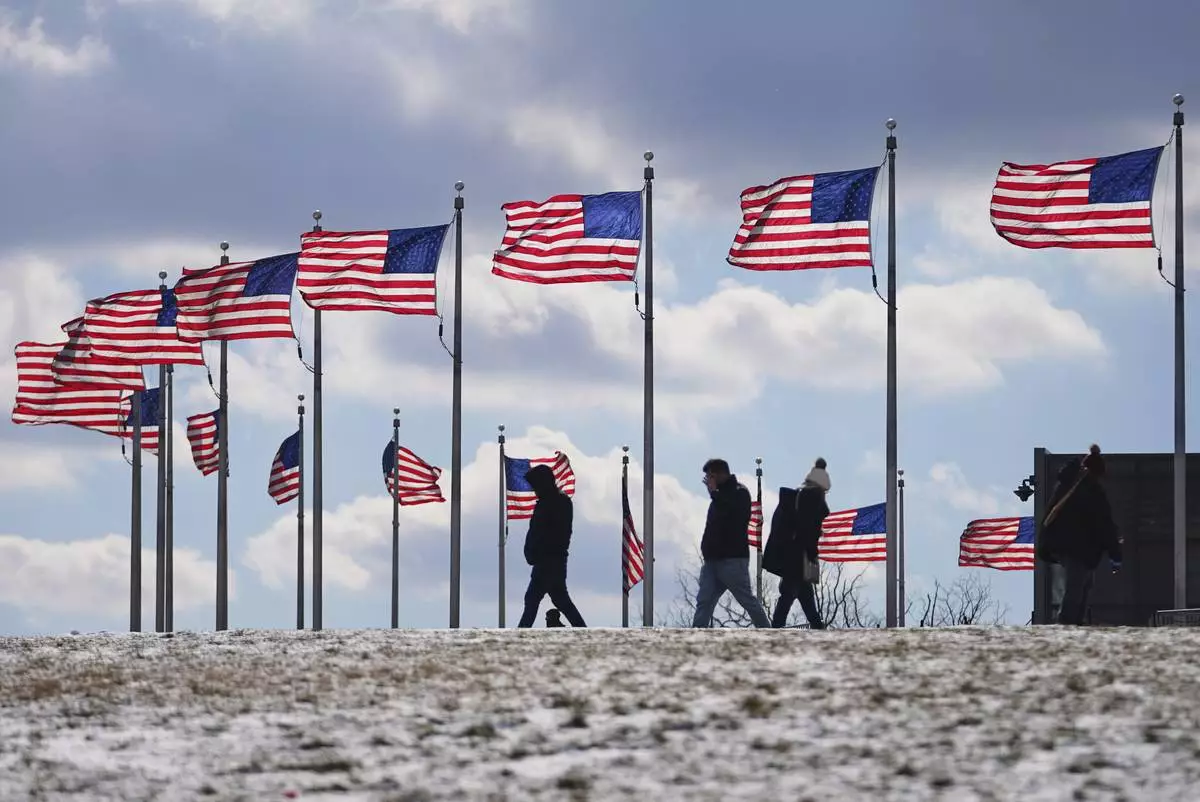
U.S. flags around the Washington Monument are at full staff during the 60th Presidential Inauguration, Monday, Jan. 20, 2025, in Washington. Flags are supposed to fly at half-staff through the end of January out of respect for former President Jimmy Carter, who died Dec. 29, 2024. (AP Photo/Julio Cortez)

A young man reacts to information on how to prepare for the upcoming changes to undocumented families living in the U.S., Sunday, Jan. 19, 2025, in Miami. (AP Photo/Marta Lavandier)
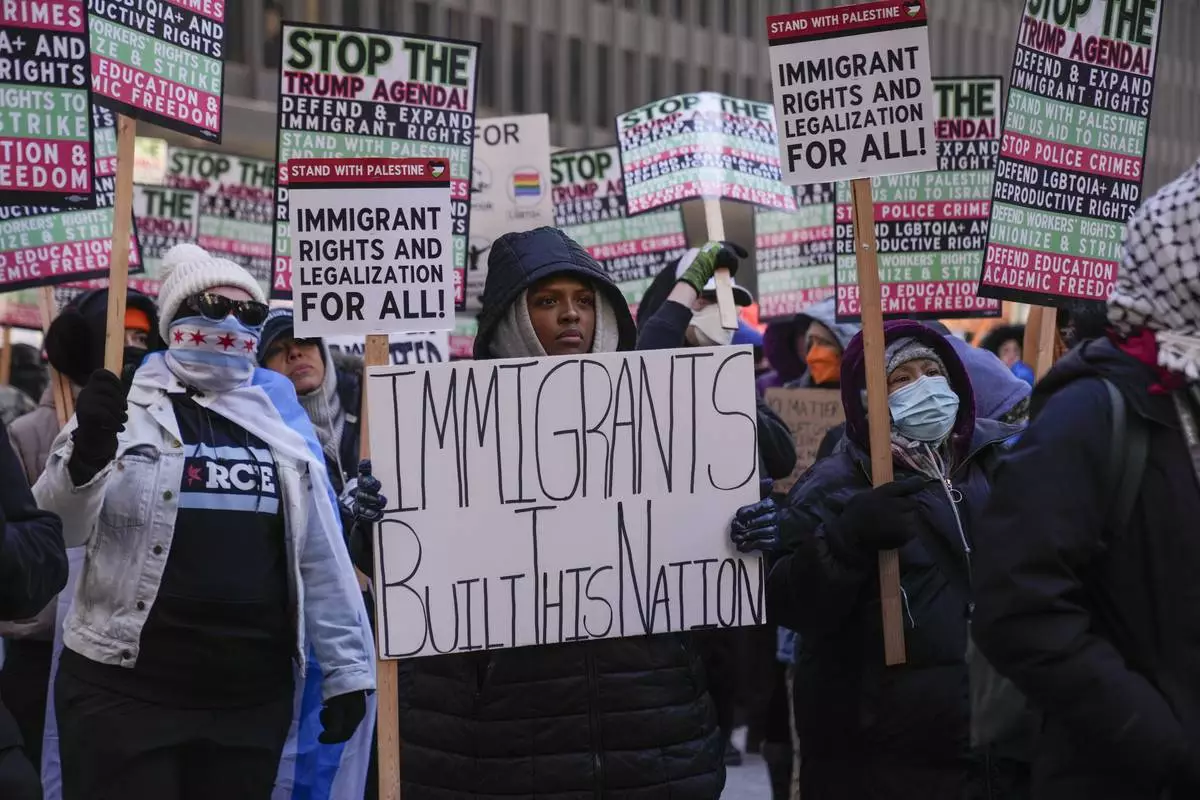
Sonia Rosa Sifore and other anti-Trump protesters gather in Federal Plaza to rally for a number of issues, including immigrant rights, the Israel-Hamas war, women's reproductive rights, racial equality and others, on the day of President Trump's Inauguration, Monday, Jan. 20, 2025, in Chicago. (AP Photo/Erin Hooley)
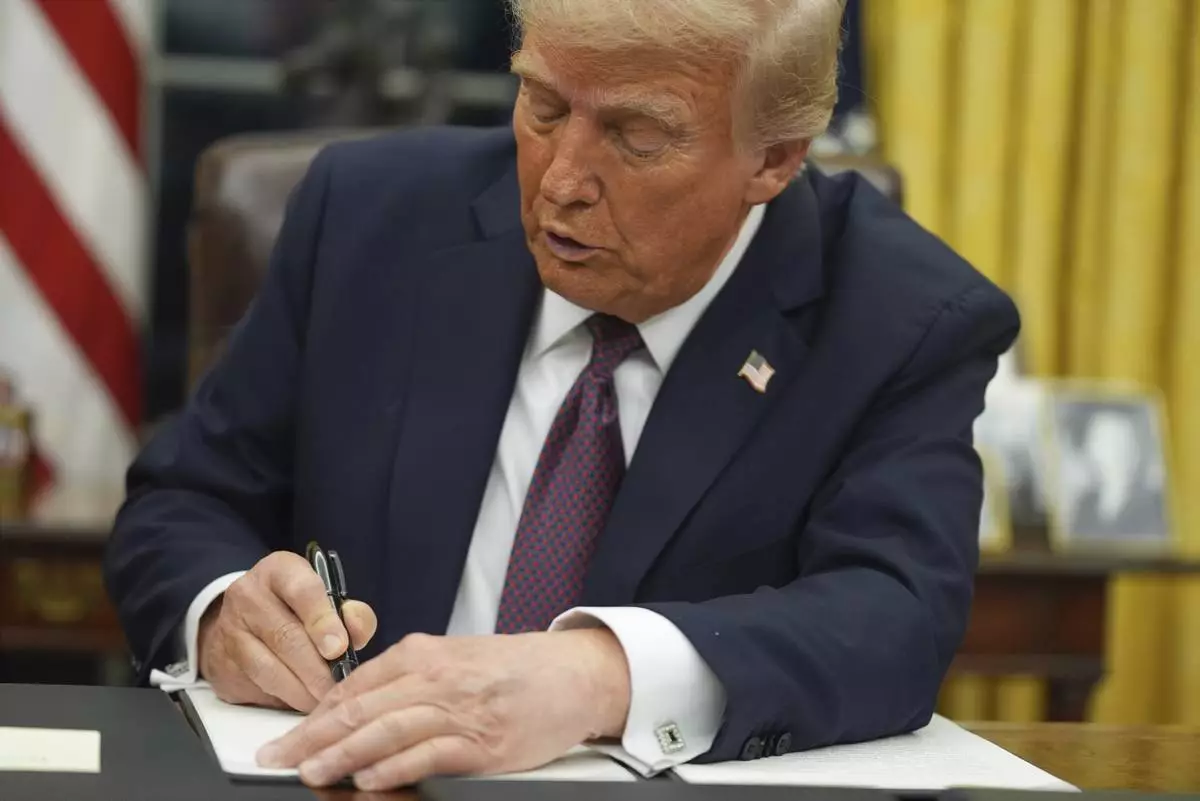
President Donald Trump signs an executive order on birthright citizenship in the Oval Office of the White House, Monday, Jan. 20, 2025, in Washington. (AP Photo/Evan Vucci)











